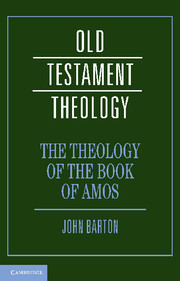Book contents
- Frontmatter
- Contents
- General Editors’ Preface
- Preface
- Abbreviations
- Chapter 1 Amos: The Critical Issues
- Chapter 2 Religious Belief and Practice in Amos’s Day
- Chapter 3 The Theology of Amos and His Circle
- Chapter 4 Theological Themes in the Additions to the Book of Amos
- Chapter 5 The Theology of the Book of Amos
- Chapter 6 The Reception of the Theology of Amos
- Chapter 7 The Theology of Amos Then and Now
- Further Reading
- Author Index
- Scripture and Apocrypha Index
- References
Chapter 7 - The Theology of Amos Then and Now
Published online by Cambridge University Press: 05 June 2012
- Frontmatter
- Contents
- General Editors’ Preface
- Preface
- Abbreviations
- Chapter 1 Amos: The Critical Issues
- Chapter 2 Religious Belief and Practice in Amos’s Day
- Chapter 3 The Theology of Amos and His Circle
- Chapter 4 Theological Themes in the Additions to the Book of Amos
- Chapter 5 The Theology of the Book of Amos
- Chapter 6 The Reception of the Theology of Amos
- Chapter 7 The Theology of Amos Then and Now
- Further Reading
- Author Index
- Scripture and Apocrypha Index
- References
Summary
There are two ways of regarding the relationship between the theology of the book of Amos and our own theological thinking. One is the “canonical” way. Here, we interpret the book explicitly from a faith position, and seek to integrate its theology into a pan-biblical theology, which is also consistent with Christian faith as we understand it. We have seen, in Chapter 5, that this is a perfectly possible route to understanding the book. The problem with it is that it becomes difficult to hear the book as saying anything different, or at least radically different, from what we already believe on other grounds. It takes its place within the canon of Scripture as a partial witness to Christian truth, and needs to be read within (and constrained by) that matrix.
The alternative is to think about the book’s theology as it emerges from a relatively uncommitted examination, and to ask whether that theology has anything still to contribute to modern theological thinking. This alternative route is open to the criticism that it is not how the faith community ever read Scripture in the past. Amos was never understood by past generations of Christians on the basis of what could be reconstructed of the book’s theology by historical-critical methods, but only as part of canonical Scripture. Once we detach it from that context, then the question arises why we should be interested in its theology anyway. It becomes simply an old religious text, and probably a not very important one.
- Type
- Chapter
- Information
- The Theology of the Book of Amos , pp. 181 - 204Publisher: Cambridge University PressPrint publication year: 2012

